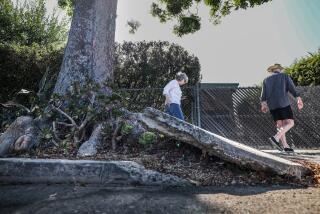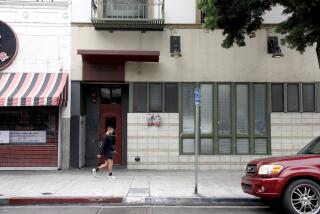Complaints Prompt L.A. Crackdown on Skid Row Businesses
Los Angeles officials on Friday moved to crack down on 17 skid row businesses alleged to be crime magnets, an unprecedented attempt to improve the living conditions of residents on some of the city’s meanest streets.
Notices were mailed to 11 residential hotels, three retail markets, two bars and one restaurant informing owners that public hearings will be held to determine if their operations should be restricted.
The notices are not condemnatory: At the public hearings, residents will be able to voice their complaints and the owners will be able to respond. The cases will then go to a zoning administrator to decide if illegal activities are occurring and whether restrictions should be imposed.
But officials said they feel confident of the mass of corroborating information they have gathered on each site, including police surveillance reports, crime statistics and declarations from residents.
Chief zoning administrator Robert Janovici said it is the largest blanket investigation the city has ever launched against a group of businesses. And it fulfills a promise Janovici made to City Council members last month to begin acting within 30 days on long-standing citizen complaints.
“We feel we have enough information to hold public hearings and inquire further whether these businesses are contributing to a nuisance in the area,” said Janovici.
The notices present an array of illegal activities that residents and surrounding businesses say they have been compelled to tolerate for years, including public drinking and associated loitering and alcohol-fueled violence, drug sales, prostitution and public urination.
It is alleged, moreover, that “the managers and owners of the nuisance locations have had several years to comply with current laws and applicable ordinances and have chosen not to, while residents and businesses have assumed the burden of dealing with the problems around the locations and their costs.”
The rampant crime has not only harmed the business climate but also contributed to the physical and social decay of the surrounding community, residents also allege. Many of the targeted locations are on 7th Street between Wall Street and Central Avenue. Other sites are on San Julian Street and Ceres Avenue.
Government investigators gathered information from several city and county agencies as well as the state Department of Alcoholic Beverage Control.
In the preceding two years, according to city officials, police recorded more than 1,000 arrests at the 17 locations for assault, battery, robbery, loitering, prostitution and other violations.
“Some of the information received is indicative of the magnitude of the nuisance problems existing in the area. . . . Police Department records appear to indicate an excessive use of police resources in response to illegal and nuisance activity in and around the locations under investigation,” zoning officials said in their notifications to the targeted businesses.
For the mostly poor community members who lodged complaints more than a year ago against several of the locations, news of the city’s action provided some relief.
“This is wonderful,” said Zelenne Cardenas, a program manager at the United Coalition East Prevention Project, an alcohol and drug prevention organization located on skid row. “For our members, the one thing they’ve been trying for the last several years is to have their voices heard. There was a fatalistic view that this is just the way it is in skid row and you can’t do anything about it. Now we’re turning the tide.”
Ron Paschall, a security and operations manager for the Central City East Assn., which represents businesses in the area, agreed that the city’s action marks a turning point for skid row.
Although it is mostly known as a haven for drug abusers, transients and the most downtrodden of the city’s residents, skid row has increasingly attracted the families of low-skilled workers who find jobs in the adjacent toy, flower and garments districts. There are day-care centers and a school in its core. And two postage stamp-sized parks now attract as many children as homeless adults. But there is nowhere for residents to shop for groceries, and the liquor stores, bars and residential hotels are stunting any potential for growth, said Paschall.
In a survey conducted in the area, he said, 50% of the businesses indicated they might move because of the city’s failure to rein in crime.
“Some of these [targeted] owners donate to charity, support worthwhile causes and they are good to their mother, but when you see the criminal activity associated with their business, it’s hard to feel sympathy for them,” said Paschall.
But those same owners adamantly defend themselves and say they are being blamed for activities on the streets over which they have no control.
“Yes, there is public drunkenness but it’s not inside, it’s on the sidewalks and we can’t control that,” said Daniel Aguirre, a desk clerk at the Hotel Rivers, who said the hotel had been cited only once recently on prostitution violations. “As for anything else, we try to maintain security. But this is a hotel and we can’t ask for birth certificates from everyone. We can’t search people coming through the door.”
ence Adelman, an attorney who represents the owner of Jack’s Market, said his client has already limited hours, increased security and lighting and stopped selling some items that might be used by addicts.
The biggest problem he’s got . . . is that he’s the one retail business on his block and when a problem erupts the police are looking for an address to put on their police report,” said Adelman. “We will vigorously respond to any action the city takes.”
The public hearings are scheduled for Aug. 5, 6, 9 and 10 in the auditorium of the Department of Water and Power.
More to Read
Sign up for Essential California
The most important California stories and recommendations in your inbox every morning.
You may occasionally receive promotional content from the Los Angeles Times.











